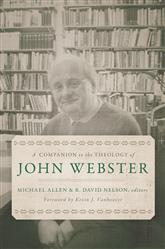A Companion to the Theology of John Webster is a great collection of essays on the development of Webster’s theology, and on major doctrines important in his work. The epilogue is unique, though: it’s a very helpful report and analysis of what Webster was working on at the time of his death.
R. David Nelson (one of this volume’s co-editors) is the author of this chapter, which he begins with the report that “in the late fall of 2007, John Webster submitted to Baker Academic a proposal for a major work of systematic theology in five volumes, which he conceived as the capstone to his long and distinguished career in Christian theology.” Nelson does a number of things in this epilogue, but the most immediately interesting thing is to offer a careful interpretation of Webster’s proposal, which he footnotes as “John Webster, Proposal for Systematic Theology, November 2007 (Document), Baker Publishing Group, Grand Rapids, 1. Hereafter, “Proposal.” In the proposal, Webster envisioned a fifteen-year process of producing the five-volume Systematic Theology, with volumes appearing from 2011 to 2025.
A couple of interesting tidbits:
As he conceived it at the time, the project would “be presented at the level of technicality and sophistication required to articulate its subject matter as searchingly as possible, and to engage in equal debate with other works of the highest intellectual caliber.” As such, Webster did not envisage Systematic Theology as a textbook or manual for use in the classroom, and he planned to avoid “routine pedagogical tasks such as introducing the terms and courses of theological controversies, outlining the thought of other theologians, or explicating technical terms as a matter of course.” Rather, the project’s “primary aim will be to enunciate and defend a set of descriptions and judgments about the substance of Christian teaching. (299)
On the task of systematic theology: It is
the comprehensive, orderly and analytic re-presentation of the reality claims made by the Christian faith. The material substance of, and the norms of judgments for, systematic theology are presented in Holy Scripture (understood as an integrated canon of prophetic and apostolic texts which minister the divine self-disclosure). The end of a systematic account of Christian reality claims is primarily contemplative (that is, intellectual apprehension of the mystery of the triune God manifest in his works), though as such it serves to edify the theological community of the church and to commend its reality claims to interested outsiders, even though its primary end is neither direct Christian instruction nor apologetic defense. (p. 300)
On his ST‘s position and context within the theological world:
“The work is not envisioned as an exercise in contextual theology,” he writes, “since (1) it will take a somewhat larger view of its subject than is afforded by any particular set of intellectual and cultural circumstances, and (2) it will envisage the task of theology as illuminating and reaching judgments about, rather than being directed by, its occasions.” Over against the general course of Christian theology in modernity, Webster meticulously avoided tethering his judgments and commitments to cultural trends, opting instead for a “free attitude to the situation of theology in relation to modern culture.” (p. 301)
The most intriguing parts of the proposal may be the parts where Webster forecasts the organization of the volumes, and the reason behind that organization:
The theological distinctiveness of the work will be visible in the particular way in which it will order the two major themes of Christian doctrine, “theology” and “economy”. Whereas it is most usual in modern accounts of Christian doctrine to give priority to the economy, the conception of Christianity to be expounded will give priority to “theology”, that is, the life God considered in himself. . . . The effects of this conception . . . will be felt throughout, beginning with the doctrine of the Trinity but extending into the treatment of all subsequent topics. It will directly affect the distribution of weight in the work, and inform judgments about how particular topics are to be shaped. (p. 301-302)
The proposed five volumes, Nelson reports, were to start with a programmatic or methodological volume on “Theology and the Presence of God,” followed by volumes on God, Creation, Reconciliation, and Consummation.
There is much more in this epilogue, including Nelson’s thoughts on how Webster intended to incorporate exegetical reasoning into his systematic work. The whole discussion of this is excellent, and I was especially intrigued by the way Ephesians was drawing Webster’s attention as some sort of model for the presentation of the Christian system. Webster had been committed (since 2003) to writing an Ephesians volume in the Brazos Theological Commentary series (a volume which this Companion‘s other co-editor, Mike Allen, has now supplied to the series). Ephesians and the proposed ST seem to have cross-pollinated in his mind in various ways. Fascinating!
The epilogue is wonderfully illuminating, and the whole collection is substantive and authoritative.
